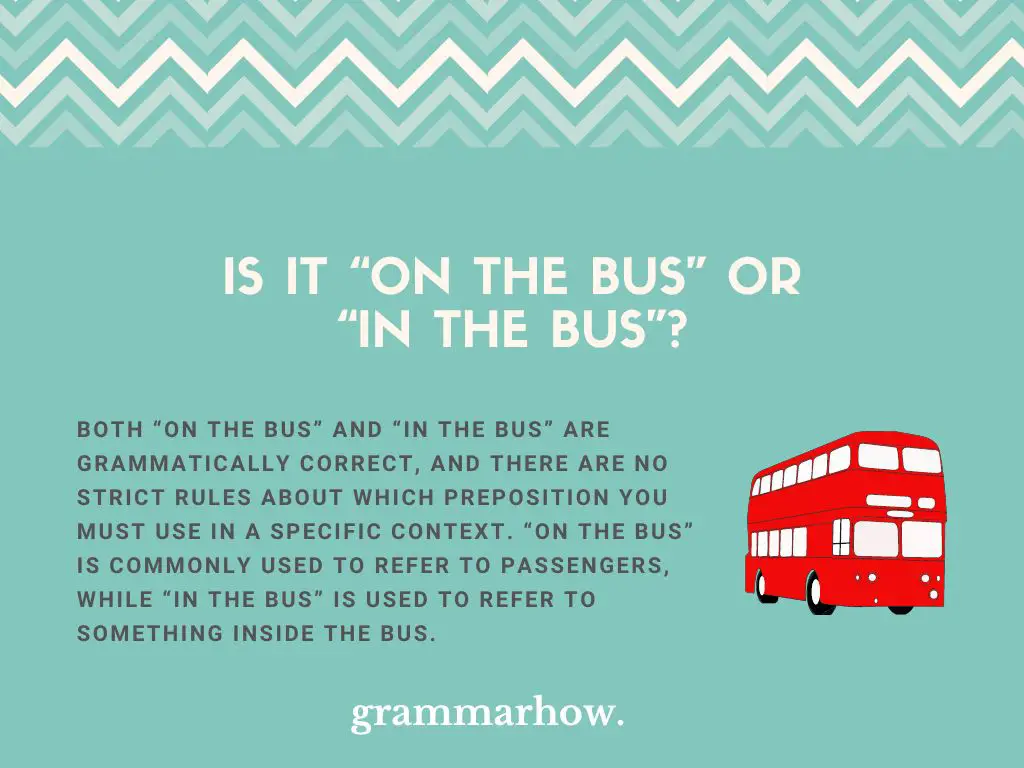What’s the correct way to express being inside of a bus? Should you say “On the bus”? Or is it “In the bus”? And what about “At the bus”? Though prepositions can be complicated, this article will clarify what phrase to use in what situation, and whether they’re correct.
Is It “On The Bus” Or “In The Bus”?
Both “On the bus” and “In the bus” are grammatically correct, and there are no strict rules about which preposition you must use in a specific context. “On the bus” is commonly used to refer to passengers, while “In the bus” is used to refer to something inside the bus.

While “On the bus” is more common than “In the bus” to express the idea of someone who is traveling, the truth is that both can be utilized.
The preposition “In” refers to something on the inside of something, and therefore it can be used to refer to travelers inside a bus.
What Does “On The Bus” Mean?
“On the bus” is an expression generally used to refer to someone who is inside of a bus, and is probably utilizing the bus to travel somewhere.
The preposition “On” is generally used to refer to something that is on top of something else, though in the context of “On the bus”, it’s simply used to refer to someone or something inside a given bus.
Here’s a few example sentences that showcase proper use of “On the bus”:
- I was on a bus when I heard about the wedding.
- She’s on the bus, and it should arrive relatively soon.
- We’re going to be on the bus by that time, hopefully resting.
- I’m on the bus right now so my phone signal isn’t the best.
- He’s on the bus that goes downtown, we can meet him at the station.
- I will be on a bus by that time, listening to music while I travel.
- They’re all on the bus, we can leave whenever you’ve finished your work.
What Does “In The Bus” Mean?
“In a bus” is a phrase used to refer to someone or something that is physically located on the inside of a bus.
The preposition “In” refers to something being inside the confines of something else, and therefore can be used with that meaning for the expression “In the bus”.
Because “On the bus” is a more common way to refer to something inside a bus, you’d most likely utilize “In the bus” if you want to be very specific about an object’s location.
Here’s some examples that should help you understand how to use “In the bus”:
- In the bus there’s a black bag with some gold lettering.
- She’s currently in the bus, resting her legs until we can depart again.
- It’s in a bus, somewhere, it’s just a matter of finding what bus it’s in.
- My luggage is in the bus, underneath my seat, hidden beneath her purse.
- They’re all in the bus, we just need to figure out which of them did it.
- All of his stuff is in the bus, we just have to search through it.
- I was in a bus when I got a phone call from my insurance company.
Is It “I Am In The Bus” Or “I Am On The Bus”?
Both “I am in the bus” and “I am on the bus” can be used to express being inside a bus, whether it’s moving or not. Both expressions are grammatically correct, though “I am on the bus” is more popular than “I am in the bus”. You can use either one.
Here’s a couple of examples to showcase both sentences in use:
- I am in the bus and we’re all waiting for you to arrive.
- I am on the bus, it’ll be traveling upstate for a few hours.
Is It “I Am Sitting On The Bus” Or “I Am Sitting In The Bus”?
“I am sitting on the bus” and “I am sitting in the bus” can both be used to refer to the action of sitting on the inside of a bus. The preposition “On” could indicate that the person is sitting on top of a bus, but this will not always be the case.
Here’s some example sentences for you to understand their use:
- I am sitting on the bus that’s going to take me to the airport.
- I am sitting in the bus in a very uncomfortable position.
Is It “Get On The Bus” Or “Get In The Bus”?
“Get on the bus” and “Get in the bus” are both grammatically correct phrases that can be used to express an order to someone, to go inside a bus. There isn’t a strict rule that determines whether one should be used over the other.
These are just a couple of examples of how you could use these phrases:
- Get on the bus because it’s about to leave.
- Get in the bus and once you’re inside you can fall asleep.
Are “On The Bus” And “In The Bus” Interchangeable?
“On the bus” and “In the bus” are both grammatically correct and equivalent phrases that may be interchanged to the speaker’s preference. Though “On the bus” sees plenty more use than “In the bus”, both are correct.
Because they’re both correct, you could use either one in conversation, and have the meaning of your sentence still be fully understood.
Though “On” and “In” are separate prepositions that are generally used in different ways, in this particular context both “On the bus” and “In the bus” mean the same thing.
Is “On The Bus” Or “In The Bus” Used The Most?
According to the Google Ngram Viewer, “On the bus” is significantly more popular than “In the bus”. The gap in use between “On the bus” and “In the bus” is immense and not easily surpassed.

The data showcases the fact that both “On the bus” and “In the bus” were barely used until the late 1910 and early 1920s, at which point both started growing at similar rates.
However, at a certain point in the late 1930s there is a divergence point, in which the growth of “In the bus” relatively stabilized, while “On the bus” kept growing in use.
This continued over the decades, to the point where nowadays “On the bus” is more than four times as common as “In the bus”.
When Should I Use “At The Bus”?
“At the bus” is a phrase that should be used only when “the bus” itself is a location that one might head towards. “At the bus” indicates that the location of someone or something is the bus itself.
Here’s a couple of examples:
- My headphones are probably still at the bus.
- My family’s waiting for us at the bus.
When Should I Use “By The Bus”?
“By the bus” is an expression that establishes the location of an object using a given bus as a reference. If something is “By the bus”, then that object is next to the bus in some fashion.
Here’s two example sentences that showcase the use of “By the bus”:
- My keys are probably by the bus, if I dropped them there.
- I’ll be waiting by the bus, you’ll be able to recognize me.
You may also like:
“On The Train” Or “In The Train”? Preposition Guide For Transportation
“Take the Bus” or “Take a Bus”? Correct Version (+Examples)
Get a Bus vs. Take a Bus vs. Catch a Bus (Helpful Examples)
